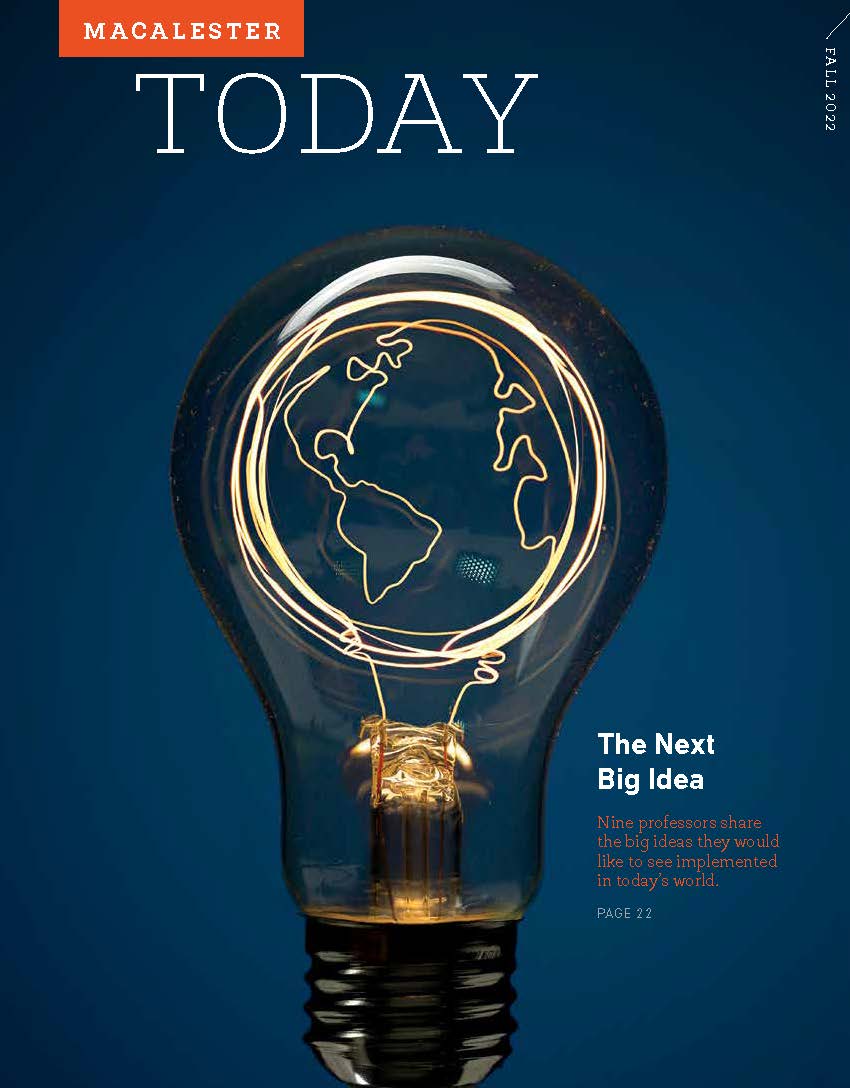
By Joe Linstroth / Illustration by Wenjia Tang
College campuses are often referred to as “bubbles” for their seemingly insular cultures and disconnection from the “real world.” But for visiting sociology professor Alisha Kirchoff, such a characterization could not be further from the truth. The college experience, she argues, is actually shaped by and a direct reflection of the forces that influence our wider society, for better and worse.
This fall, Professor Kirchoff and her students aim their critical lenses at themselves in an effort to explore how college shapes who they are and who they become, the similarities and differences between the Macalester experience and those at other colleges and universities, and what needs to change in order to make the college experience more equitable.
This is the first time you’ve taught a class about college life. Why were you compelled to create this course?
As a sociologist, I feel a moral obligation to help guide students in thinking about the structures they inhabit and the impacts that those structures can have on people. My point of departure for the class is how a group of people can come into a college environment and have very different experiences within that institution and then have very different experiences once they leave that
institution, even though they’re all carrying a piece of paper that says the same thing: a bachelor’s degree from this place. And then discuss how that fits into this larger ecosystem of social stratification and inequality in society.
Historically, a college degree was supposed to be the great equalizer, and college is often a vehicle for class mobility—it’s a vehicle for wonderful things. But what has happened over time and what is not discussed in that same conversation is how college and university life is itself a system where inequalities that exist in broader society are replicated or, at times, perpetuated, and that they can also be challenged.
The goal with this class is to turn the lens on the college experience as they’re living it, to think about how it’s reflective of broader patterns or how it reinforces patterns of inequality in society. But then also to think about college as a social structure in and of itself, where we have experiences that are different from others and why that might be the case.
One of the concepts you employ to have this discussion is called “sociological imagination.” Explain what that is.
It’s where we make the familiar strange.
Sociological imagination is about seeing the world as it is, as opposed to how we are, and knowing the difference. There are people who say there’s no such thing as an objective truth, and yes, of course, we all see things through the lens of our own experiences. But what the sociological imagination invites us to do is to think about things outside of ourselves and our own lived experiences and to understand that there are multiple truths that can coexist at the same time. It helps us try to see the world through the lens of experiences that are not our own, and importantly, to not assess a normative value to those experiences.
How do you get students into that frame of mind to be able to look beyond their lived experiences?
I usually start by asking them questions that seem like “well, duh” kind of questions. For example, why would you go to college? As a faculty member who has spent a large amount of time in education, it’s absurd that I would ask that question, but that question can be taken a lot of different ways.
There is a pedagogical strategy called “the structured discomfort” where you guide students through a set of ideas that might be difficult or in conflict with their worldview. And you do that not in big chunks, not by hitting anyone over the head, but by taking small bites of a challenging issue throughout the course of the semester.
I’m looking for a way to show students at Macalester how abundantly privileged they are just by being here, and what they can do with that and what their experiences at Macalester mean when they leave. Even students who do not necessarily come from what we think of as being typically privileged backgrounds, just being in this space at this time with the resources available provides opportunities that a state school or community college doesn’t. By showing students the whole spectrum of diversity of experiences that are possible in college, I hope it will help them assimilate what their college experiences are in a different way.
Why is this class relevant right now?
I think we’re on the precipice of a transformation and have been for the last few years. The nature of college is changing—who is able to access it is changing and the importance of it. There’s a shift in the narrative that’s questioning broadly the importance and meaning of college.
There’s also been a lot of introspection in higher ed that has caused people to ask, “What are we doing?” Attending college has gotten really expensive and it’s increasingly out of reach for people, so what’s the value added? COVID and going online really accelerated some of those conversations.
This is a good moment to engage in conversations with Macalester students who are bright and civically minded to simply read some things and ask, “What is the point of all of this?” “Who is this for?”
November 21 2022
Back to top





